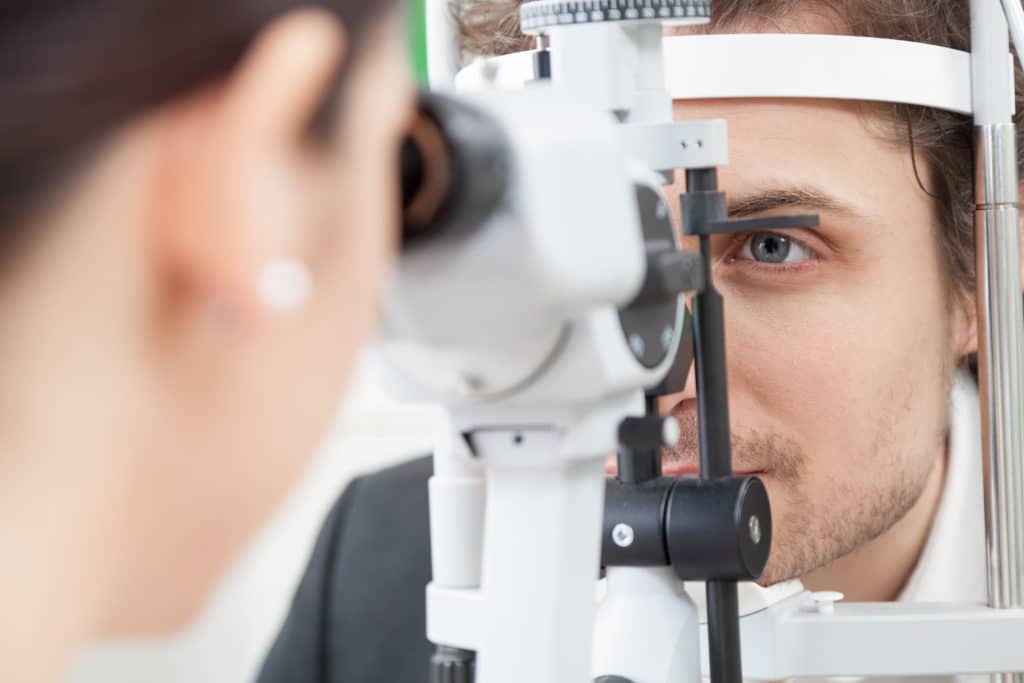
Jump to Section
The retina is the layer of cells at the back of the eye which is sensitive to light and passes nerve impulses to the brain to create a visual image. The retina is susceptible to several types of diseases or damage, but the ophthalmologists at Boston Vision can help care for your retinas to ensure eye health and proper vision.
BRVO
Branch retinal vein occlusion, or BRVO, occurs when the retinal vein becomes blocked, impacting vision. Laser procedures, medications, or other treatment options can help stabilize vision and prevent swelling for patients with BRVO.
Cotton Wool Spots
Due to lack of blood flow, small white areas called cotton wool spots can appear on the retina. These can indicate serious medical conditions and should be treated by an ophthalmologist.
CRAO
Central retinal artery occlusion, or CRAO, is a blockage of the main artery that oxygenates the retina. Lack of oxygen due to CRAO can cause vision loss or other complications.

Fluorescein Angiography
A fluorescein angiography is an examination in which pictures of the retina are taken to screen for or diagnose various eye diseases.
ICG Angiography
An indocyanine green angiography, or ICG angiography, is performed by injecting a green dye into the blood stream followed by taking images of the retina to screen for abnormal blood vessels.
Lattice Degeneration
Lattice degeneration is a thinning of the peripheral retina. This is typically asymptomatic but can cause distorted or blurred vision and reduced peripheral vision.
Macular Hole
A macular hole is a defect in the center of the retina. This causes blurry and distorted vision and, if left untreated, complete loss of central vision.
OHS
Ocular Histoplasmosis syndrome (OHS) occurs due to exposure to a fungus found in the central United States. OHS causes blank spots in vision, distorted vision, or changes in color perception.
Retinal Detachment
In some cases, the retina can become detached, resulting in vision loss. Some forms of retinal detachment represent a medical emergency. For most patients, retinal detachment can be treated or repaired surgically.
Retinitis Pigmentosa
Retinitis Pigmentosa is a rare genetic disorder that causes permanent loss of sensory cells within the retina, resulting in slow, progressive vision loss.
Retinoschisis
Retinoschisis is a degenerative disease most common in elderly patients. It causes separation between the two major layers of the retina.
Stargardt’s Disease
Stargardt’s disease is a genetic disorder which causes the deterioration of cells within the retina. This disease is relatively rare, but proper diagnosis and care is important to help patients maintain their eye health.
Toxoplasmosis
Toxoplasmosis is caused by exposure to a common parasite known as Toxoplasma gondii. Symptoms can include seeing floaters, blurry vision, tearing, redness, pain, and sensitivity to light.
Schedule an Appointment
If you suffer from diseases or complications with the retina, it is crucial to see a qualified specialist. To schedule your appointment, book an appointment online or give us a call at 617-202-2020.
Retina Services are available at all our locations: Brookline, Milford, Medford, Lawrence, Wellesley, Burlington, Woburn and Andover.





